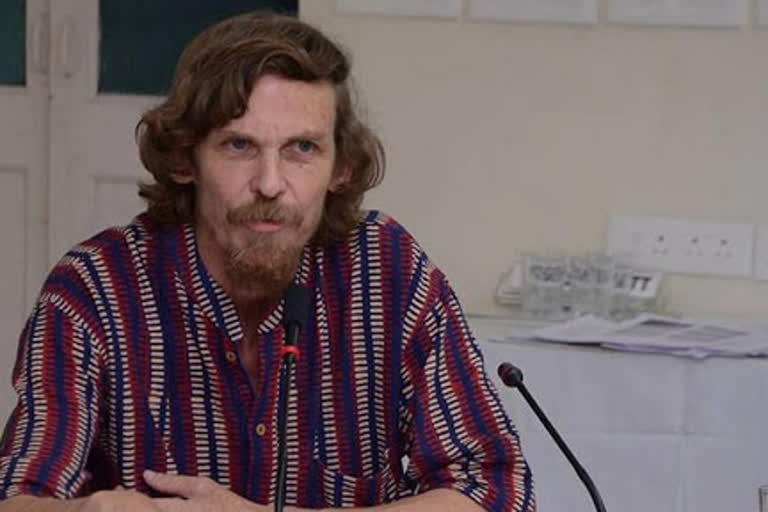Hyderabad: Jean Drèze, a Belgian-born Indian economist, has been working on several development issues in India like hunger, famine and social inequality, for the past four decades.
He believes that the central responsibility of the Center and states is to ensure food and financial security to guest (migrant) workers, who are on a reverse exodus to their native places.
Drèze, who is currently an honorary professor at the Delhi School of Economics and visiting professor at the Department of Economics, Ranchi University, suggested several measures like distributing food grains to the poor, strengthening the Public Distribution System and implementing employment guarantee schemes.
He spoke on several issues concerning migrant workers in his interview with Eenadu’s special correspondent ML Narasimha Reddy.
Here is the excerpt from the interview:
Q. After the lockdown, what is the extent of the consequent food crisis in India?
Jean Drèze: The Public Distribution System (PDS) can prevent hunger to a large extent. The Center’s decision to double the quantity subsidized food grains for three months is a good move. But there are 50 crore people outside the PDS. Not all of them are poor but most of them are. The majority of them might fall below the poverty line amid this pandemic.
In Jharkhand, there are thousands of poor people without ration cards. It is difficult to quantify the extent of the food crisis but we are heading towards a critical juncture. In order to overcome it, all these families must be included under PDS. The Food Corporation of India (FCI) has huge food stocks. The government must release these food grains immediately.
Q. Are the central and state governments taking necessary measures to ensure the safety of these workers?
Jean Drèze: The Center can do a lot better by supporting the rehabilitation activities carried out by state governments. It should supply food stocks to the states and distribute food grains to non-ration cardholders also. Since the revenues have plummeted, central government must increase its financial aid to the states. The central and state governments should coordinate in order to provide employment opportunities under the National Rural Employment Guarantee Act. PDS, pensions and employment and social security schemes will help the poor to overcome the current crisis. Welfare activities like setting up public kitchens and transferring money to beneficiaries’ accounts will be helpful. Existing welfare schemes must be implemented more effectively.
Q. Has there been a food crisis so severe in modern Indian history?
Jean Drèze: Prior to Independence, India witnessed the Bengal Famine, which was far worse than what we are seeing now. After that, there have been occasional instances of food shortages occurred as a result of famines. During 1966-67, we had the great drought in Bihar. Post-Independence, the current food crisis is the worst we have witnessed till now.
Q. What are the reasons behind the government’s inefficacy in dealing with the exodus of migrant workers?
Jean Drèze: Usually, governments have a harsh attitude towards migrant workers. This time, the attitude was there for all of us to see on the TV and the Internet. Over the past few weeks, the Center and host states were cruel in their dealings with these workers. With no work, food or help from the government; these workers chose to walk thousands of kilometers to reach their homes. This mirrors our attitude towards the poor. Instead of helping them in this crisis, we have pushed them deeper into the abyss.
Q. Is India going to face a severe nutritional crisis?
Jean Drèze: Certainly. India has the highest percentage of malnourished population. Most people have little to no protection from hunger despite the welfare schemes and PDS. Having a stomach full is not the only criterion for nutrition. Good nutrition includes proper dietary regime, clean food and water. The Indian poor have no access to any of these. The current lockdown has only increased their woes. Without financial assistance from the government, their situation can take a turn for the worse.
Q. In the coming days, should states focus more on migrant workers’ issues? Are any efforts underway?
Jean Drèze: Poorer states, especially in Northeast India, need more assistance. They have been severely damaged. Companies have benefited from the cheap Northeastern labor but abandoned the workers in the face of crisis. Without support from the Center, these states cannot help their workers. In fact, the Center should take more responsibility in helping the guest workers.
Q. State governments expect a shortage of labor as workers who returned to their villages unlikely to come back anytime soon. What do you suggest?
Jean Drèze: Guest workers will come back one day or the other. For some period, they may take up work close to their native places. Due to the surplus of labor in states in Bihar and Jharkhand, workers’ wages may see a drop. Industry owners may take undue advantage of this situation. We already saw some states making changes to labor laws by repealing laws that favor the workers. Lack of employment opportunities and food crisis have pushed the workers into dire circumstances, preventing them from speaking against the changed labor laws.
ALSO READ: Chhattisgarh: Rare black panther spotted at Achanakmar Tiger Reserve after 7 years



